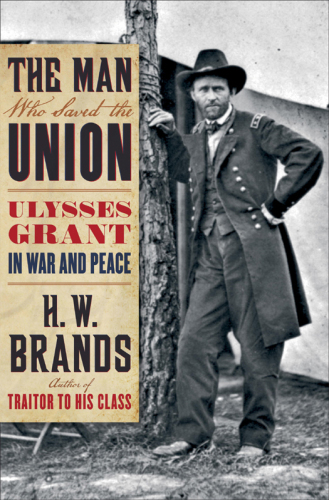
The Man Who Saved the Union
Ulysses Grant in War and Peace
کتاب های مرتبط
- اطلاعات
- نقد و بررسی
- دیدگاه کاربران
نقد و بررسی

Starred review from May 21, 2012
This authoritative biography of an obscure failure and occasional drunkard who became a Civil War generalissimo and the 18th U. S. president is a study in two kinds of moral courage. The first infused Grant’s military leadership with decisiveness, confidence in his own judgment, and a usually well-calculated willingness to gamble men’s lives on risky maneuvers. The second inspired his presidency to a principled and effective support of the rights of freedmen in the South (sometimes at bayonet point) that politically consolidated the war’s fragile verdict. Unfortunately, Grant’s judgment failed him on business matters, from bad horse trades in his youth to the loss of his fortune in old age to a Wall Street ponzi scheme—and failed the nation’s economy when his tight money policies exacerbated the depression of the 1870s. This new biography by University of Texas–Austin history professor Brands (Traitor to His Class) is comprehensive but well-paced and vividly readable; his narrative of Grant’s military campaigns in particular is lucid, colorful, and focused on telling moments of decision. His Grant emerges as an immensely appealing figure—though except for a wartime outburst of anti-Semitism, later repented, which the author relates—with a keen mind, stout character, and unpretentious manner. The result is a fine portrait of the quintessential American hero. Photos. Agent: req.

June 15, 2012
An unabashed admirer of the great Civil War general portrays the most unlikely, reluctant American hero since George Washington. While there are moments of frustrating small-picture detail to veteran biographer Brands' (The Heartbreak of Aaron Burr, 2012, etc.) book, his portrayal of his subject's essential humanity proves truly compelling. The author sticks to Grant's own words, through letters and contemporary records, rather than relying on what later historians wrote. Since Grant was so unassuming and unprepossessing, this can be a torturous exercise. From his initial reluctance to consider himself a candidate for West Point, to his taking up farming in Illinois and business out of desperation to support a growing family, largely relying on filial indulgence and always uncomfortable managing his wife's slaves, Grant never displayed a sense of self-confidence, except in handling horses. The breakout of the war saved Grant from drifting, and he was soon swept up in preparing his local militia in Galena, Ill., where he was employed in his family's business. In his methodical fashion, Brands shows how Grant's quiet proficiency continually caught the attention of his superiors. His ability to organize, discipline and inspire his men gained him swift promotions and earned him accolades in a series of signal battles, especially Vicksburg. Though President Lincoln doubted some of his strategies, Grant was the general that Lincoln needed ("[H]e makes things git! Where he is, things move!" Lincoln declared), and with William Sherman as Grant's right-arm scourge, the Rebels were ground into the sea. Brands also considers Grant's reputation for drinking, his deep devotion to his wife, his aversion to speechmaking and politics and his moral center. A direct, engaging approach to Grant's life that would have pleased him.
COPYRIGHT(2012) Kirkus Reviews, ALL RIGHTS RESERVED.

May 1, 2012
A New York Times best-selling historian/biographer who's given us firm portraits of Benjamin Franklin, Andrew Jackson, and Franklin Delano Roosevelt, among others, Brands here takes on Civil War general and two-term president Ulysses Grant. Grant's reputation suffered after the war, partly because of Southern resentment, and Brands is out to give us a fairer, better picture. He reveals a first-rate general and a President who was both popular and compassionate, working hard to protect the rights of freedmen; Brands calls him the last presidential defender of black civil rights for nearly a century. I'm betting on this one.
Copyright 2012 Library Journal, LLC Used with permission.

June 1, 2012
With the Grant-biography market full of scholarly works by William McFeely, Brooks Simpson, and Jean Edward Smith, Brands' entry, like Geoffrey Perret's Ulysses S. Grant (1997), is designed for a wide readership. Synthesized from basic sources, such as Grant's memoirs, and informed by Brands' knowledge of nineteenth-century American history, about which he's written numerous popular titles, the narrative straightforwardly presents Grant's life, from his boyhood love of horses to his stoical perseverance in finishing his memoirs during his terminal illness in 1885. From extensive quotation of his correspondence, Brands depicts his devotion to his wife, Julia, and friction with his father, for whom, at the nadir of his life in the 1850s, when he was forced to resign his officer's commission, he was reduced to working. These sections well prepare the reader for the vertiginous reversal in Grant's fortunes during the Civil War. Opining on matters for which critics attacked Grant (being surprised at the Battle of Shiloh, scandals during his presidency), Brands' able portrayal captures the immense popularity that enveloped him in both life and posterity.(Reprinted with permission of Booklist, copyright 2012, American Library Association.)

























دیدگاه کاربران